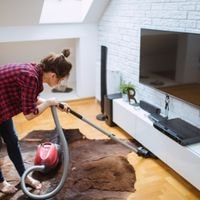How To Get Curry Smell Out Of House. Curry is a fragrant dinner dish that is prepared using many strong spices such as turmeric and basil.
The strong odor can be extremely difficult to air out of your home because, as the curry is being cooked, the odorous vapors are released. Even after cooking, the vapors continue to penetrate porous surfaces like walls, carpets, upholstery, and draperies.
If you want to successfully remove the curry smell from your house, you need to break apart each grease molecule by using a combination of different cleaning methods- this will eliminate any chance of the smell returning.
How To Get Curry Smell Out Of House
Mix equal parts washing up liquid and vinegar in a bucket. You can apply this mixture to your kitchen table, counters, range hood, cupboard doors, and any other surfaces in your kitchen.
There is a lot of curry residue on all surfaces in the kitchen. Frequently rinse the cleaning rag.
In this article, we talk about how to get the curry smell out of the house.
Cleaning Yourself
When you cook curry, your hands, clothes, and even your body can be affected. If you do not change your clothes after you’ve cooked curry, then the smell will be on you wherever you go.
The worst part is, it might seem as if someone else smells like curry when in fact it’s just you. To fix this problem, wash any affected garments with warm water and soap.
You can also use lemon juice or vinegar to get rid of the odor from your hands.
However, don’t throw these items into a washing machine with other clothing because that could cause the curry smell to spread onto other pieces of clothing.
Clear Space Molecules
When cooking a dish that might have pungent aromas, one must ensure that their house is well-ventilated and tidy before starting to cook.
The best way for this is to open up all the windows in the kitchen as well as any fans which are in the room.
If a strong scent is being released, turn them on and place them on a high setting so it drives away some of the molecules within the air.
In addition, shut any doors to other rooms so that it doesn’t make their way into other areas of your home.
Get Odor Absorbers
Ventilating and handwashing alone are not always enough to get rid of the smell. In situations like this, you’ll want to try using an odor removal product.
These products are specifically made to eliminate common smells in your home or offices like onion and garlic or other various food odors. The first option here would be baking soda.
Baking soda is great for absorbing odors because it contains natural qualities which can help neutralize unwanted scents.
Baking soda is a natural neutralizer of both acidic and basic odor molecules, so yes, place a bowl of this substance where the smell seems to be. Baking soda will suck up whatever unusual scent that it finds in your space.
If baking soda for whatever reason is not ideal for you, try other options like air purifying bags or charcoal bags, which do an excellent job of eliminating smells from the air. You can even use an air purifier instead.
Using White Vinegar
Another tool that will come in helpful in a variety of house cleaning jobs is white vinegar, which you should keep on hand at all times.
Yes, white vinegar may be used to combat the odor of curry in your home. Simply keep a bowl or two of white vinegar near the stove.
It acts similarly to baking soda in that it absorbs any odor molecules from the cooking kettle. Spray the afflicted areas with a white vinegar solution.
Simply add two teaspoons of this product to each glass of water you put into the spray bottle. Spray all of the afflicted areas after that.
Flowers Or Leaves Boiled
Boiling flowers or leaves with a nice aroma is a good idea. Bring two cups of water to a boil in a saucepan set over high heat.
Flowers or leaves with a strong scent, such as kewra leaves, jasmine, or vanilla essence, can be added. Reduce the heat to a low setting and cook for at least an hour.
The aromas produced will be strong enough to mask any lingering odors from your dinner that would otherwise find their way into other parts of your house.
Related Guides
